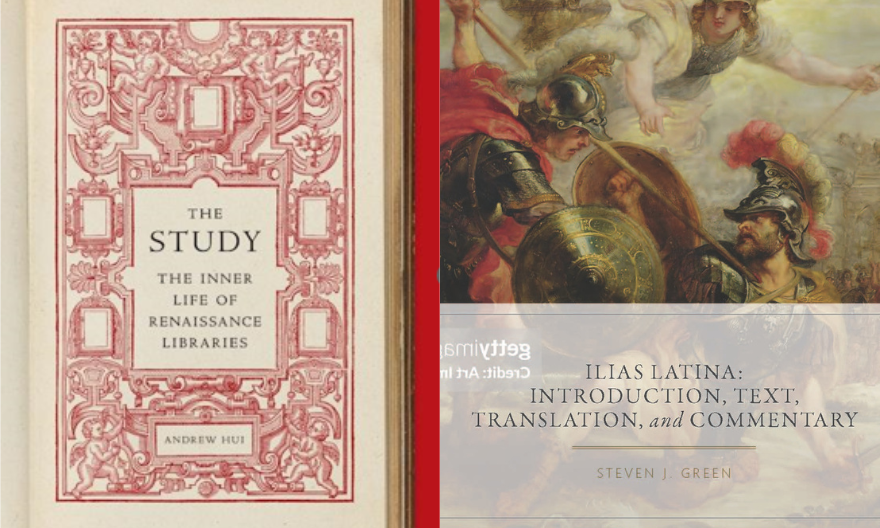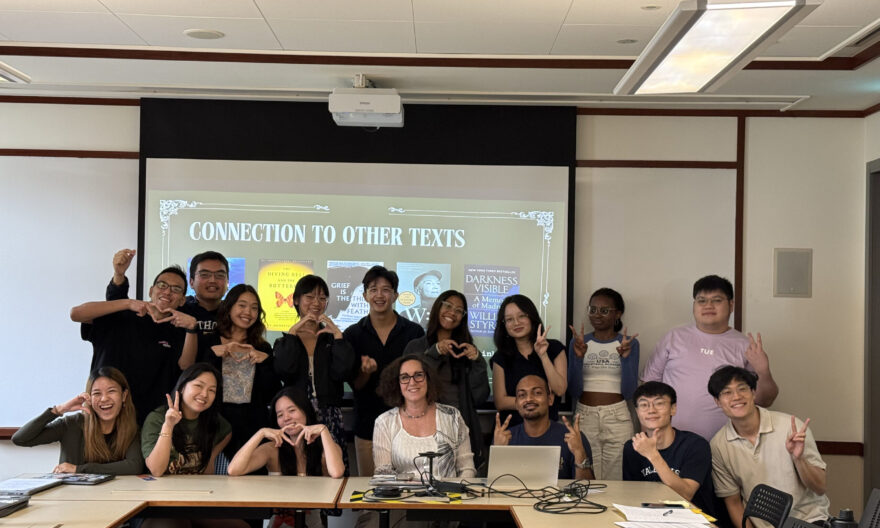Yale-NUS students learn from practising artists in different fields
Concert pianist Ms Li Churen is no stranger to performing in grand concert halls, international classical music festivals, or even playing classical piano in clubs. Yet, her commitment to her craft does not stop at performance. As a part-time faculty member at Yale-NUS College beginning in the Academic Year (AY) 2020/2021, Ms Li takes great care to impart her love of music to students.
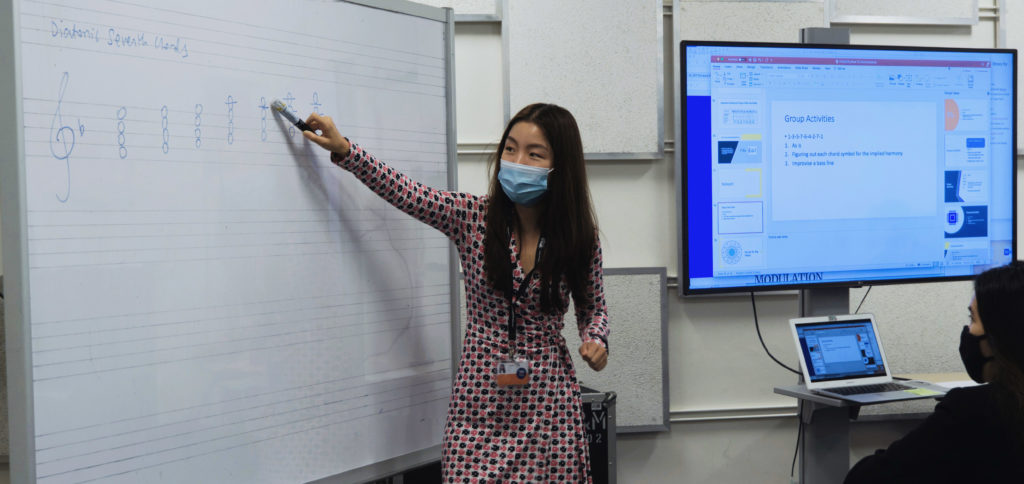 Ms Li Churen explaining music theory concepts to students of Integrative Music Theory 1. Image taken by Noelle Ngoc Phan for Yale-NUS College.
Ms Li Churen explaining music theory concepts to students of Integrative Music Theory 1. Image taken by Noelle Ngoc Phan for Yale-NUS College.
As part of the various course selections available to Yale-NUS students, two arts modules offered in AY2020/21 semester 1 are being taught by practising artists. These are Integrative Music Theory 1, taught by Ms Li, and Beginning Acting for the Stage taught by theatre practitioner Mr Jonathan Vandenberg.
Like Ms Li, Mr Vandenberg has also spent years bringing his craft to audiences. Having worked as a director in New York, he has directed an off-Broadway production and worked on several experimental theatre projects with a group of collaborators he met in graduate school.
For Mr Vandenberg, the diverse and international nature of the student population drew him to the College, as he knew it would accommodate work on both Western and non-Western materials for his theatre course.
Similarly, Ms Li, who is also an Artist Fellow at the Yong Siew Toh (YST) Conservatory of Music at the National University of Singapore (NUS), was attracted by the broad-based approach to learning at the College, a philosophy that she shares as an artist.
Through their classes, students with different levels of prior exposure have gotten the opportunity to explore artistic mediums that they are interested in.
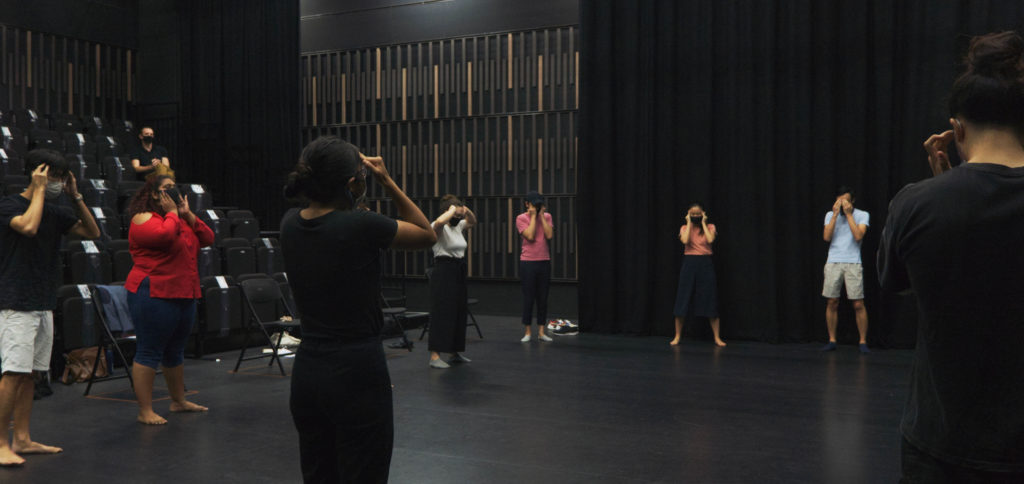 Students of Beginning Acting for the Stage participating in an acting exercise. Image taken by Noelle Ngoc Phan for Yale-NUS College.
Students of Beginning Acting for the Stage participating in an acting exercise. Image taken by Noelle Ngoc Phan for Yale-NUS College.
Speaking about Beginning Acting for the Stage, Mr Vandenberg said, “The class is divided into four units: short exercises, a contemporary Western scene, an audition monologue, and a non-Western scene. We also incorporate games, Viewpoints (movement and composition for the stage), and a professional actor as a guest speaker.”
For some students like Morgane Ropion (Class of 2022), who has been acting since the age of three, the course offered her the opportunity to return to the foundations of acting and fully grasp the essentials of the craft. Yet, she appreciated that the course was able to cater to both beginner actors and students with prior experience.
Despite being actively involved in theatre production and directing, Ashley Sim (Class of 2022) said that she was not comfortable with acting and wanted to challenge herself.
“I’m more of a behind-the-scenes kind of person,” she shared. “It’s been a period of challenge but also growth! The first pair scene I performed was particularly memorable as I was extremely nervous but the generous feedback and support from my peers and Jonathan really uplifted me, giving me more confidence as an actor.”
Furthermore, the experience that Mr Vandenberg brought to the classroom was highly valued by students.
“Beyond helping us with our acting, he made us work through small composition exercises to familiarise ourselves with the creative process behind theatre-making,” Morgane said.
Ashley added, “His experience in the New York theatre scene is always illuminating as I’m able to hear about different theatre experiences from around the world.”
“Ultimately, the goal is to connect students to their profound passion. I introduce a range of material and tools for them to do so,” Mr Vandenberg said.
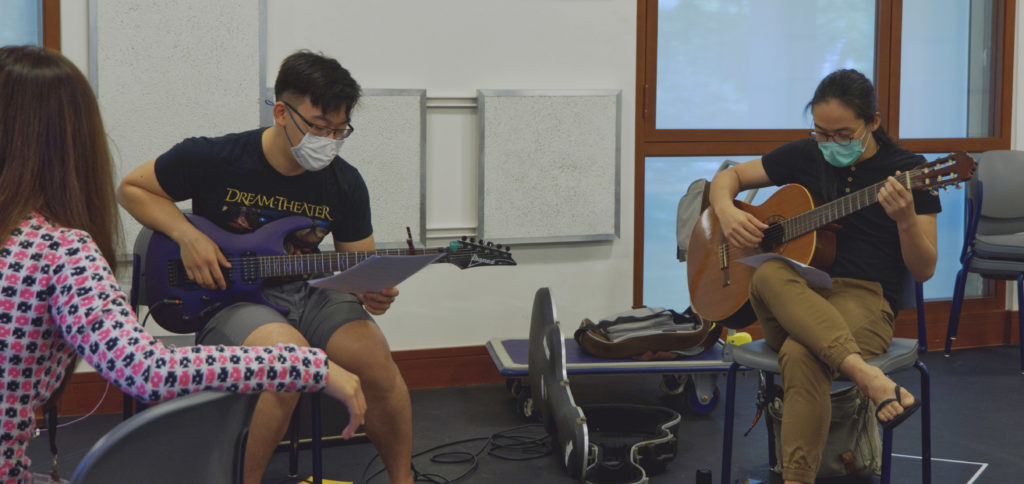 Ms Li’s (left) students, including Nigel Loh (centre), are encouraged to participate in classes with their own instruments. Image taken by Noelle Ngoc Phan for Yale-NUS College.
Ms Li’s (left) students, including Nigel Loh (centre), are encouraged to participate in classes with their own instruments. Image taken by Noelle Ngoc Phan for Yale-NUS College.
Nigel Loh (Class of 2021), a self-taught guitarist and a student in Integrative Music Theory 1, expressed a similar sentiment about Ms Li’s course.
“It’s been very reassuring because she knows so much and has been so patient with us and our different starting points. I think her experience as a performer also ensured that class isn’t just a theory class but one that is rooted in practical application,” Nigel said.
The module placed a heavy emphasis on practical applications of theoretical skills, an approach heavily influenced by Ms Li’s experience as a pianist. “As a practitioner-teacher, I am always thinking about how students can apply what they’ve learnt in class to their musical lives outside of the classroom as creators and audiences, beyond the theoretical elements of music,” she said. “To me, music theory is a tool for engaging with music at a deeper level – whether it’s playing in a band, singing in an acapella group, or consuming music on Spotify.”
“I want my students to gain the aural, conceptual and performance skills needed to engage with music in their daily lives. Therefore, a lot of emphasis is placed on the doing,” she added.
In addition to teaching, Ms Li conceptualised and initiated the YST-Yale-NUS College Music scheme this semester, a programme allowing Yale-NUS students to receive practical music lessons with peer tutors from the Yong Siew Toh Conservatory of Music. She will also be teaching Integrative Music Theory 2 in Semester 2, for students to build on the skills they have learnt in Integrative Music Theory 1.
To students like Nigel, Ms Li’s methods have definitely added value to his engagement with music. “Knowing music theory is like knowing another language,” he said. “Music has such a direct and unmediated link with our emotions, and learning theory is like learning to grasp how we feel and intonate these things.”
Watch the video below to find out how students gained valuable perspectives through classroom discussions, interactions and hands-on practice.

